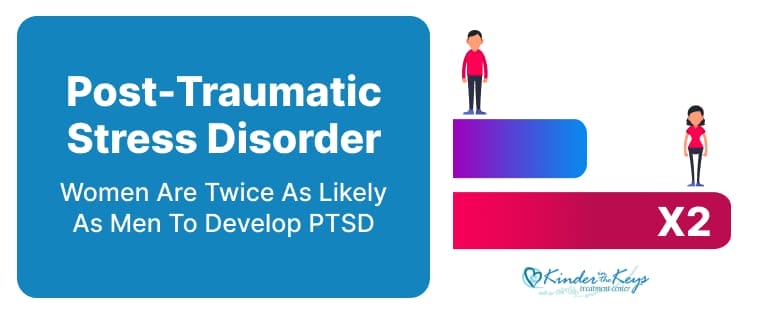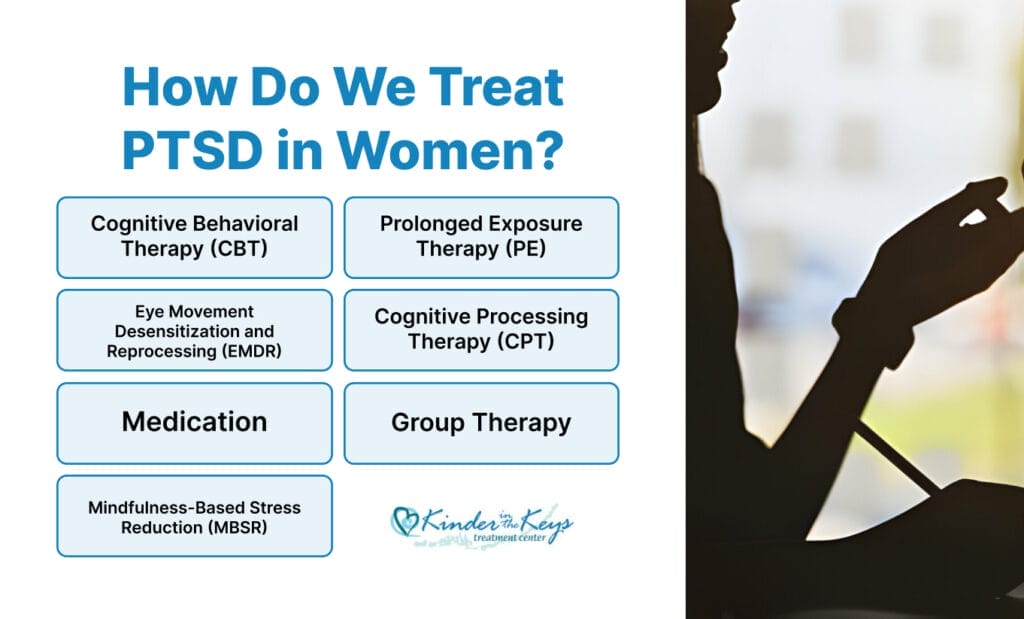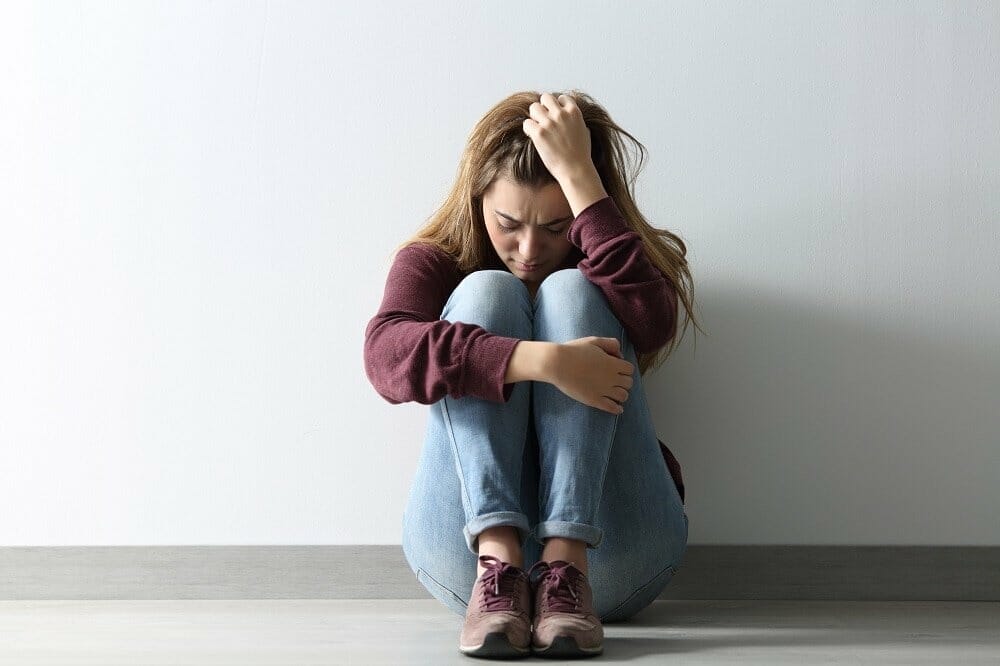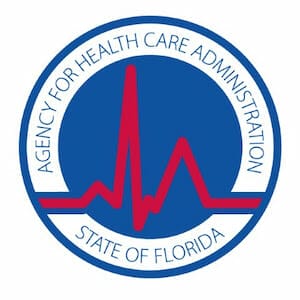Often, when we hear about post-traumatic stress disorder (PTSD), our minds jump to images of soldiers and war zones.
While these are certainly valid contexts where PTSD manifests, the disorder extends far beyond, touching the lives of people across all demographics, including a large number of women worldwide.
The relevance of PTSD in women is not just a matter of PTSD statistics; it’s about understanding the nuanced gender differences that impact how traumatic stress affects men and women differently and the critical need for tailored support and treatment.
Here, we’ll explore PTSD specifically as it relates to women—exploring how and why women are so much more likely to experience trauma and the PTSD that can develop as a result.
PTSD Research in Women
Recent studies have enriched our understanding of how PTSD manifests in women, particularly emphasizing the gender-specific experiences and outcomes of trauma. Women are likely to encounter traumatic events in their lifetimes — and from a younger age — with a significant portion facing severe consequences like PTSD.
Notably, research in psychological medicine highlights that sexual assault and childhood sexual abuse are more prevalent among women, underlining the importance of gender in both the experience of trauma and the development of PTSD. Even though men and women face many of the same traumatic events in their lifetimes (such as natural disasters, life-threatening illness, or interpersonal trauma), women experience PTSD at two to three times the rate of men. This is widely attributed to the type of traumas women are more likely to endure, such as sexual assault or repeated exposure to abuse.
One cohort study of over 51,000 women found that those with high PTSD symptoms and comorbid probable depression had a significantly increased risk of mortality. This underscores the severe implications of PTSD beyond just mental health conditions and into physical symptoms, suggesting that addressing both PTSD and depressive symptoms in women could be crucial in reducing mortality risks associated with these conditions.

Why Do Women Have a Higher Frequency of Post Traumatic Stress Disorder?
Post-traumatic stress disorder (PTSD) is a mental health condition that can emerge after a person has experienced or witnessed a terrifying event. Interestingly, research reveals that women are twice as likely as men to develop PTSD, not just because of the nature of the traumatic events they may experience but also due to biological, psychological, and social differences that increase the lifetime prevalence of the disorder in women.
It’s In the Biology
From a biological standpoint, hormonal factors play a significant role. Women’s hormonal fluctuations are thought to enhance the consolidation of emotional memories, which is central to PTSD. This means that when a traumatic event occurs, the emotional impact and associated memories might be more strongly imprinted in women than in men.
Experts suggest that estrogen and progesterone, hormones more prevalent in women, could potentially increase sensitivity to stress and fear responses, making traumatic memories more vivid and difficult to manage.
Psychological Sex Differences
Psychologically, women are more likely to ruminate on distressing experiences and have a tendency to repeatedly think about or dwell on stressful events, which can exacerbate PTSD symptoms. This pattern of thinking can reinforce negative emotions, maintain PTSD symptoms longer, and exacerbate stress reactions in present and future situations.
In contrast, men are more likely to use avoidance strategies, which, while not necessarily healthy in the long term, can temporarily buffer the impact of stress on mental health in the face of a dangerous event.
Social Impacts
Socially, the types of multiple traumatic events commonly experienced by women often involve interpersonal violence, such as sexual trauma and assault, as well as narcissistic abuse; these all carry a high risk of developing PTSD afterward.
The deeply personal and violating nature of these experiences can profoundly affect one’s sense of safety and self-worth, compounding the psychological impact and leading to trouble feeling emotions. Moreover, societal responses to such traumas—often marked by stigma or disbelief—can further isolate the victim, hindering recovery and exacerbating feelings of guilt and shame.

How Do We Treat PTSD in Women?
Increased awareness has led to better support systems and treatment approaches that are more sensitive to the unique experiences of female trauma survivors. Here are some of the ways a holistic PTSD treatment center helps women:
Mindfulness-Based Stress Reduction (MBSR)
Practicing mindfulness, which focuses on being intensely aware of what you’re sensing and feeling in the moment without interpretation or judgment, can help reduce symptoms of stress and anxiety and mitigate the negative mental health consequences of racing or negative thoughts. It has shown to be effective for both women and men.
Cognitive Behavioral Therapy (CBT)
A form of talk therapy that focuses on changing negative thought patterns that contribute to PTSD symptoms. It involves learning coping skills and strategies to deal with distressing thoughts and situations, even in the middle of a traumatic event.
Prolonged Exposure Therapy (PE)
Another type of CBT talk therapy involves gradually exposing patients to memories and stimuli related to traumatic events in a safe and controlled manner, helping them process and confront their fears.
Eye Movement Desensitization and Reprocessing (EMDR)
Helps patients process and integrate traumatic memories through guided eye movements, reducing the emotional impact of these memories.
Cognitive Processing Therapy (CPT)
A specific type of CBT talk therapy helps patients learn to challenge and modify unhelpful beliefs related to the trauma, aiming to alter the way they think about and live with their traumatic experiences.
Medication
Antidepressants, such as selective serotonin reuptake inhibitors (SSRIs) and serotonin-norepinephrine reuptake inhibitors (SNRIs), are commonly prescribed to help manage symptoms of PTSD, including anxiety and depression.
Group Therapy
Offers a supportive environment where individuals can share their experiences and coping strategies with other women who have undergone similar traumas, fostering a sense of community and understanding.
Getting Help for PTSD
Seeking help for post-traumatic stress disorder marks a pivotal moment in your journey toward recovery, whether or not you’ve already received a PTSD diagnosis. It goes beyond mere symptom management or exposure to fewer traumatic events: it aims at a deeper understanding and processing of your trauma within a safe and supportive environment.
This crucial action sets the foundation for healing, gradually enabling you to regain control over your life and emotions. At Kinder in the Keys, we’re all about finding strategies that allow you to cope with the past while paving the way for a more stable and fulfilling future.
The decision to seek help also brings positive changes to your relationships. It can mend the fractures caused by PTSD, enhancing your ability to communicate and connect with loved ones. Furthermore, getting help from a mental health professional, connecting with family and friends, and engaging in support groups are proven and effective ways to combat PTSD (and any related anxiety disorders) for both women and men.
Start Getting Help at Kinder in the Keys Today
Tackling PTSD symptoms sooner rather than later prevents them from escalating and potentially leading to other complications such as depression or substance use. It’s about equipping yourself with knowledge and tools for managing stress and triggers effectively. Remember, reaching out for help is a demonstration of courage and the first step towards reclaiming your life from the shadows of trauma.
FAQs
What does a PTSD episode look like?
A PTSD episode can involve a range of symptoms, from intrusive memories and flashbacks to severe anxiety and physical reactions to anxiety disorder like sweating or heart palpitations. The nature of these episodes can vary significantly among individuals, influenced by the type and context of the traumatic experience.
How long after a traumatic event does PTSD usually start?
The onset of PTSD can vary; for some, symptoms may appear within a month of the trauma, while for others, they may not emerge until years later. Early interventions, such as Trauma-Focused Cognitive Behavioral Therapy (TF-CBT) and Eye Movement Desensitization and Reprocessing (EMDR), are recommended shortly after the traumatic event happened to prevent the progression to PTSD.
What if I have PTSD and another mental health condition, like depression or anxiety?
Co-occurring disorders, such as depression and anxiety alongside PTSD, are common and can complicate the treatment process. It’s vital to treat each condition, which may involve a combination of medication, therapy, and support from healthcare professionals. The interplay between these conditions can significantly impact the effectiveness of treatment strategiesand can also put you at risk of developing physical health problems.





